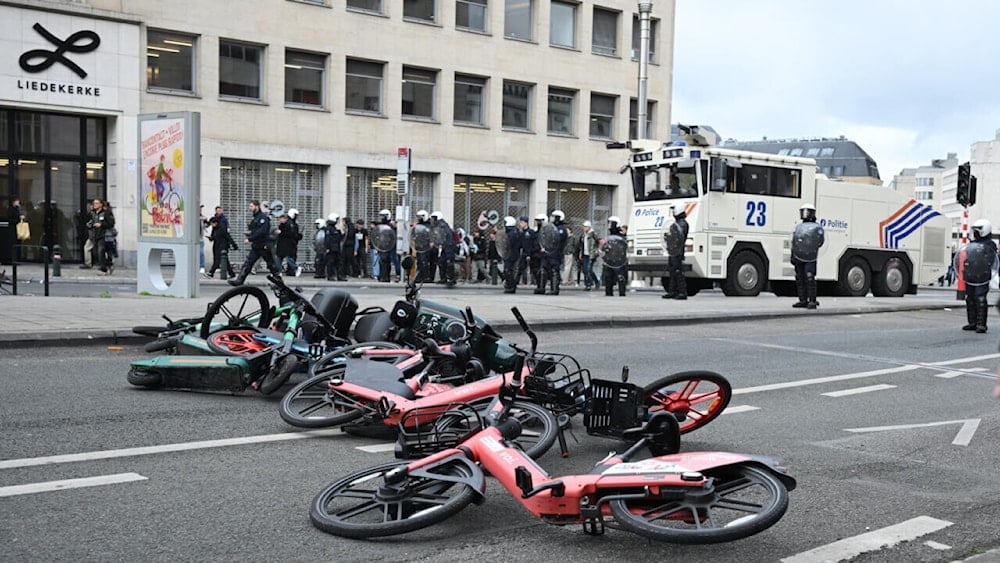Belgium braces for nationwide strikes over austerity reforms
Belgium is set for three days of nationwide strikes as unions challenge Prime Minister Bart De Wever's austerity agenda, warning his reforms threaten social protections and deepen inequality.
-

File photo of bikes and scooters used as a roadblock during a general strike in Brussels taken on October 14, 2025. (AP)
Belgium is preparing for severe nationwide disruption this week as unions launch a coordinated three-day strike to challenge the government's planned austerity program and major reforms to labour and social protections.
The action will unfold in stages. Transport workers are the first to walk out on Monday, with the national railway operator SNCB warning that only a portion of scheduled services will run: two out of three trains in some areas, and as few as one in three on others. Several Eurostar connections between Brussels and Paris have already been scrapped.
On Tuesday, the pressure expands as employees across public services, including teachers, childcare staff, and hospital workers, join the stoppage. Unions have reserved their most sweeping action for Wednesday, when they intend to halt activity across virtually all sectors. Aviation officials say no flights are expected to depart from either of Belgium’s major airports, Brussels-Zaventem or Charleroi, on that day.
Freeze on salary indexation, pensions cut, social protections under attack. Enough is enough.
— Workers' Group EESC (@WorkersEESC) November 21, 2025
Full solidarity with the Belgian trade unions striking on 24, 25 and 26 November. ✊🇧🇪 https://t.co/pCh1loftSi pic.twitter.com/yJGWa6AL7v
A clash over austerity
The country’s main labour organisations initiated the strike to push back against measures advanced by Prime Minister Bart De Wever, who has pledged to tackle Belgium’s mounting debt burden, one of the highest in the EU, through an extensive package of structural reforms. His plans, presented as essential to restoring fiscal stability, include labour-market liberalisation, changes to unemployment benefits, pension restructuring, and significant spending cuts tied in part to increased defence allocations.
The government recently concluded a contentious budget negotiation for 2026, which aims to trim the deficit by more than €9 billion by 2029. The agreement relies on a mix of spending cuts and tax increases, including higher levies on air travel, bank profits, natural gas, and share transactions, adding further fuel to union anger. Critics argue that the burden of adjustment falls disproportionately on workers and low-income households.
De Wever has implemented only a fraction of his agenda so far, hampered by ideological splits within his five-party coalition. He has instructed partners to reach consensus by Christmas, including on the latest austerity steps, but divisions remain deep and have slowed implementation. The unions hope the strike will intensify pressure on those internal negotiations.
In a statement announcing the walkout, unions described their action as "an appeal to Prime Minister De Wever and the entire government to put an end to the dismantling of social programs." The FGTB, the country’s largest socialist federation, accused the prime minister of showing "contempt" and "disrespect" toward the labour movement and the tens of thousands of Belgians who depend on public services now facing cuts.
Previous mobilisation
This week’s walkouts follow earlier attempts to pressure the government. In mid-October, tens of thousands of demonstrators flooded the streets of Brussels to protest what they described as "brutal" budget reductions. That rally later descended into clashes with police, who used tear gas and water cannon to disperse parts of the crowd.
Bruxelles paralysée par une grève nationale : plus de 100 000 manifestants dans les rues, vols annulés, transports publics fortement perturbés. Les syndicats dénoncent les mesures d’austérité et le coût de la vie.#bruxelles #belgique #grève pic.twitter.com/AMbB2DWLEO
— Anadolu Français (@aa_french) October 14, 2025
While the demonstration revealed deep public frustration, it had limited impact on the government’s fiscal trajectory, prompting unions to escalate their strategy ahead of the year-end political deadline.
Read more: Belgium raises legal hurdles to EU’s use of frozen Russian assets

 3 Min Read
3 Min Read








